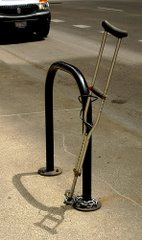 Check out this article in today's Wall Street Journal for a story about how a high school succeeded in bringing people with disabilities into the mainstream. Also see here for a special online feature they've published about the same topic.
Check out this article in today's Wall Street Journal for a story about how a high school succeeded in bringing people with disabilities into the mainstream. Also see here for a special online feature they've published about the same topic.What I find compelling about this story, especially in light of some comments on an earlier post, is how success was defined in this story. The quick summary of the article is that by including students with disabilities in regular classes, they were empowered to believe that they could succeed. One particular student tried hard but did not pass the required state tests. He was still able to achieve his dream working for the army, if only as a truck driver on base. He is now on a path to his goal of being a combat infantryman or a paratrooper, if he works hard and proves himself.
"Adam says [his high school] educators made him feel his disabilities didn't resign him to isolation or failure. 'Even though I am just a truck driver, I am proud of what I do and what I've become,' he says. 'I believe deep down inside that I have succeeded already.'"
.jpg)




